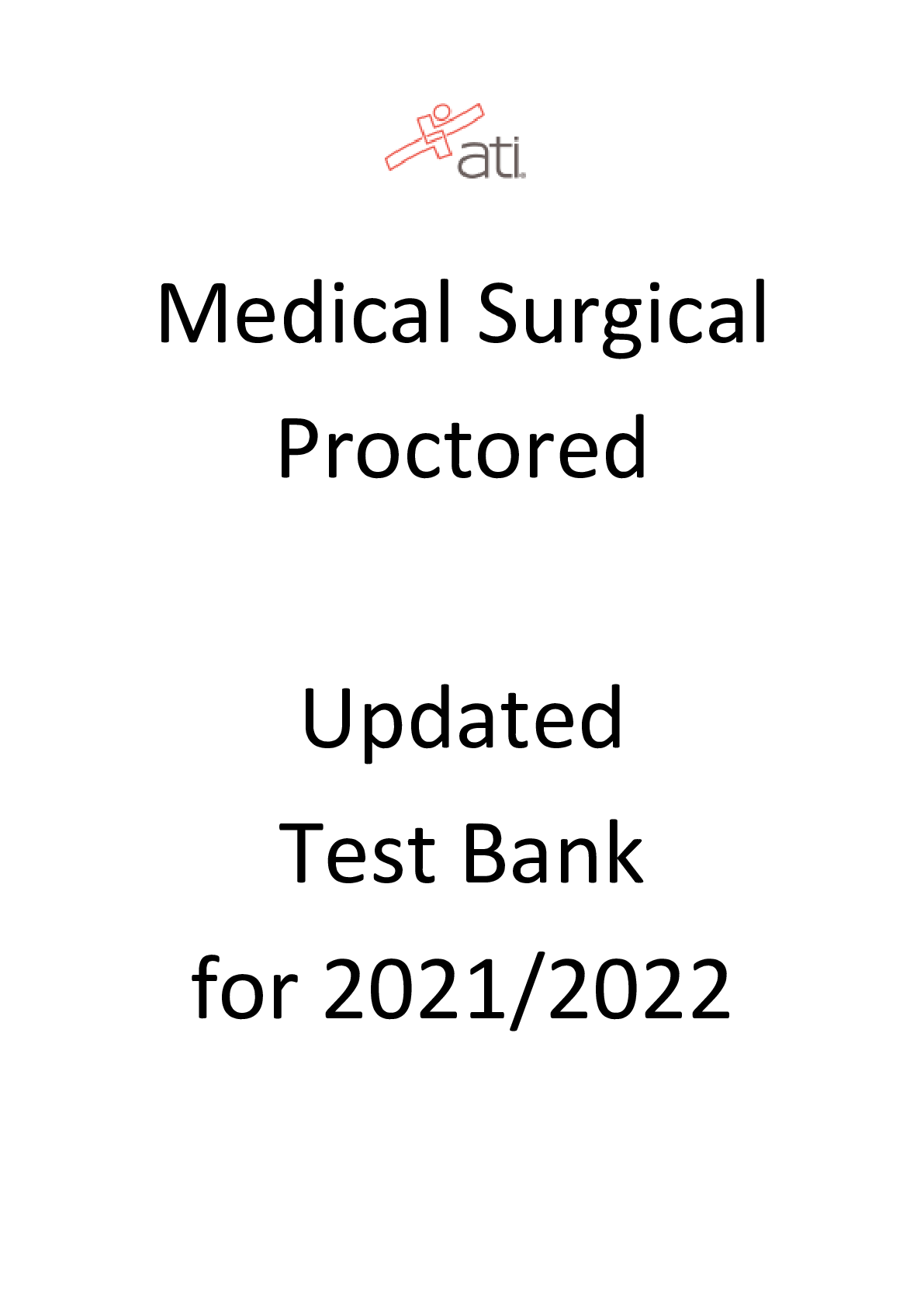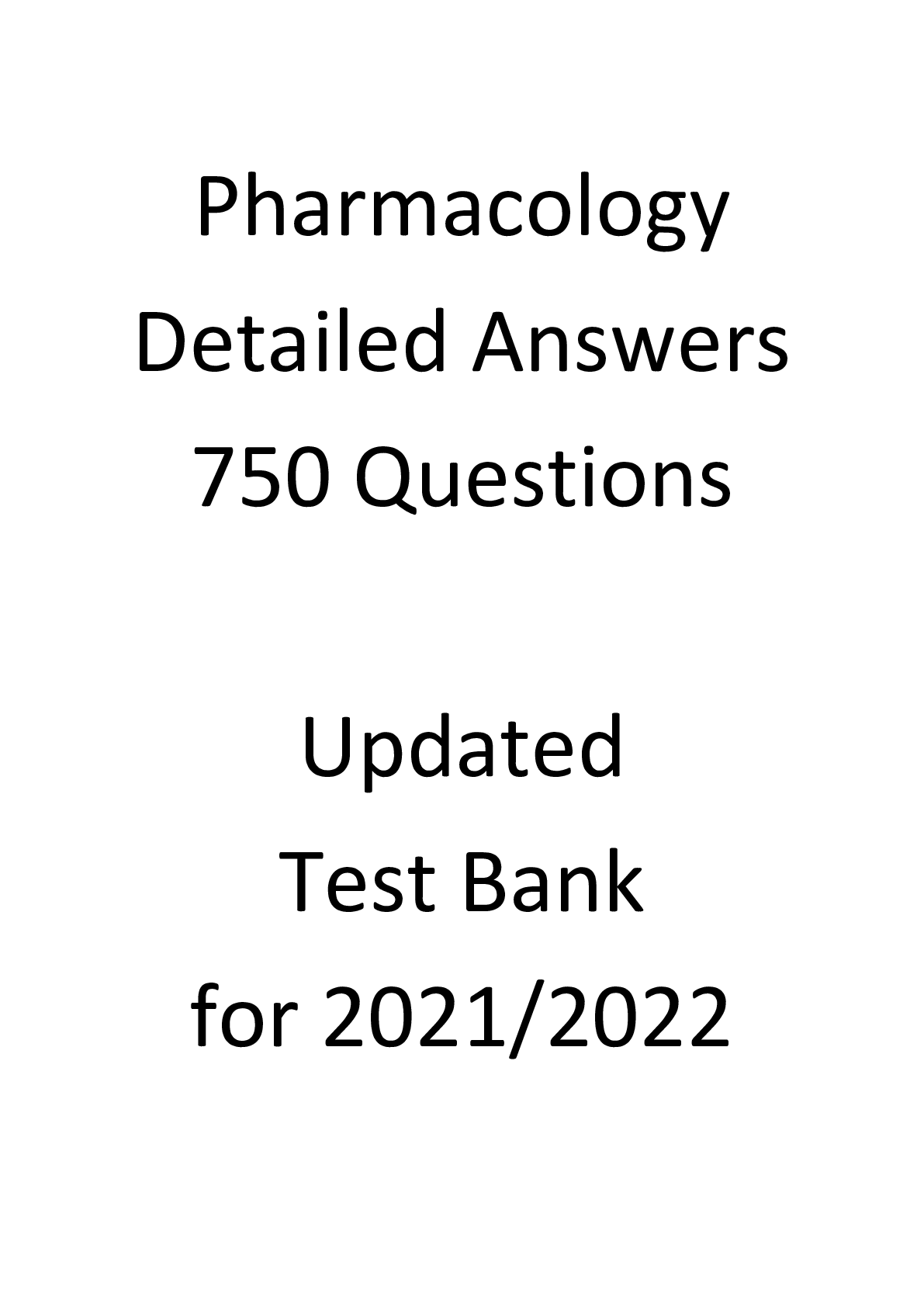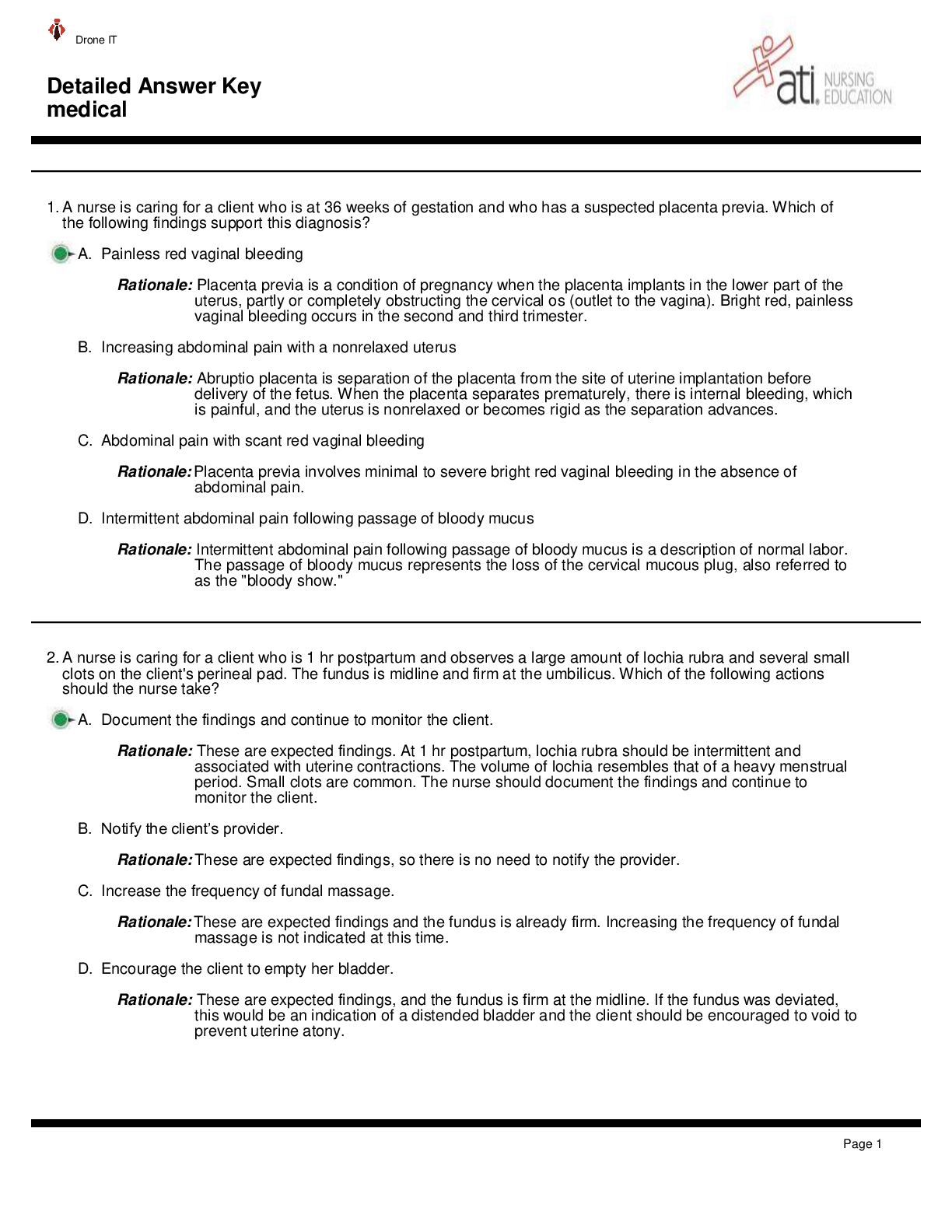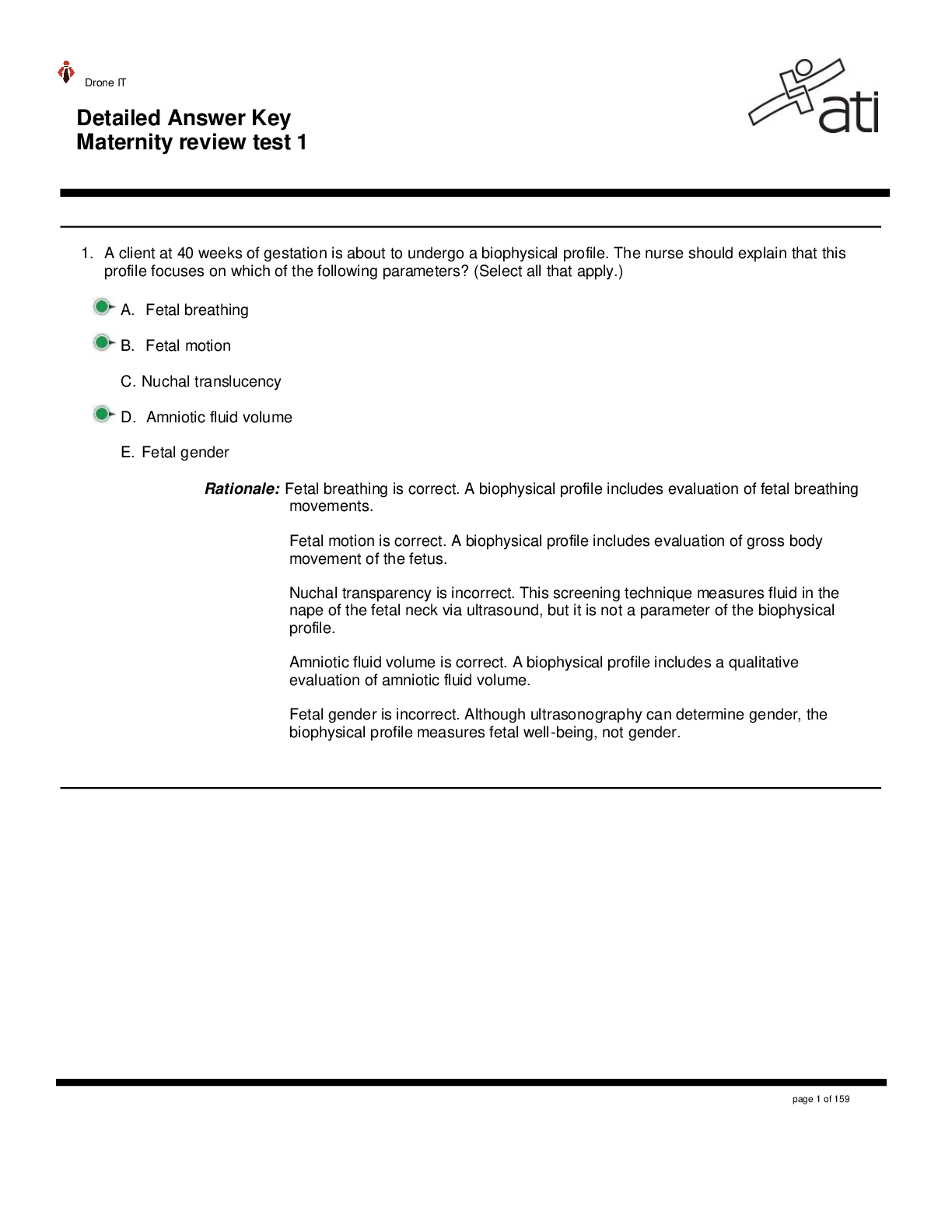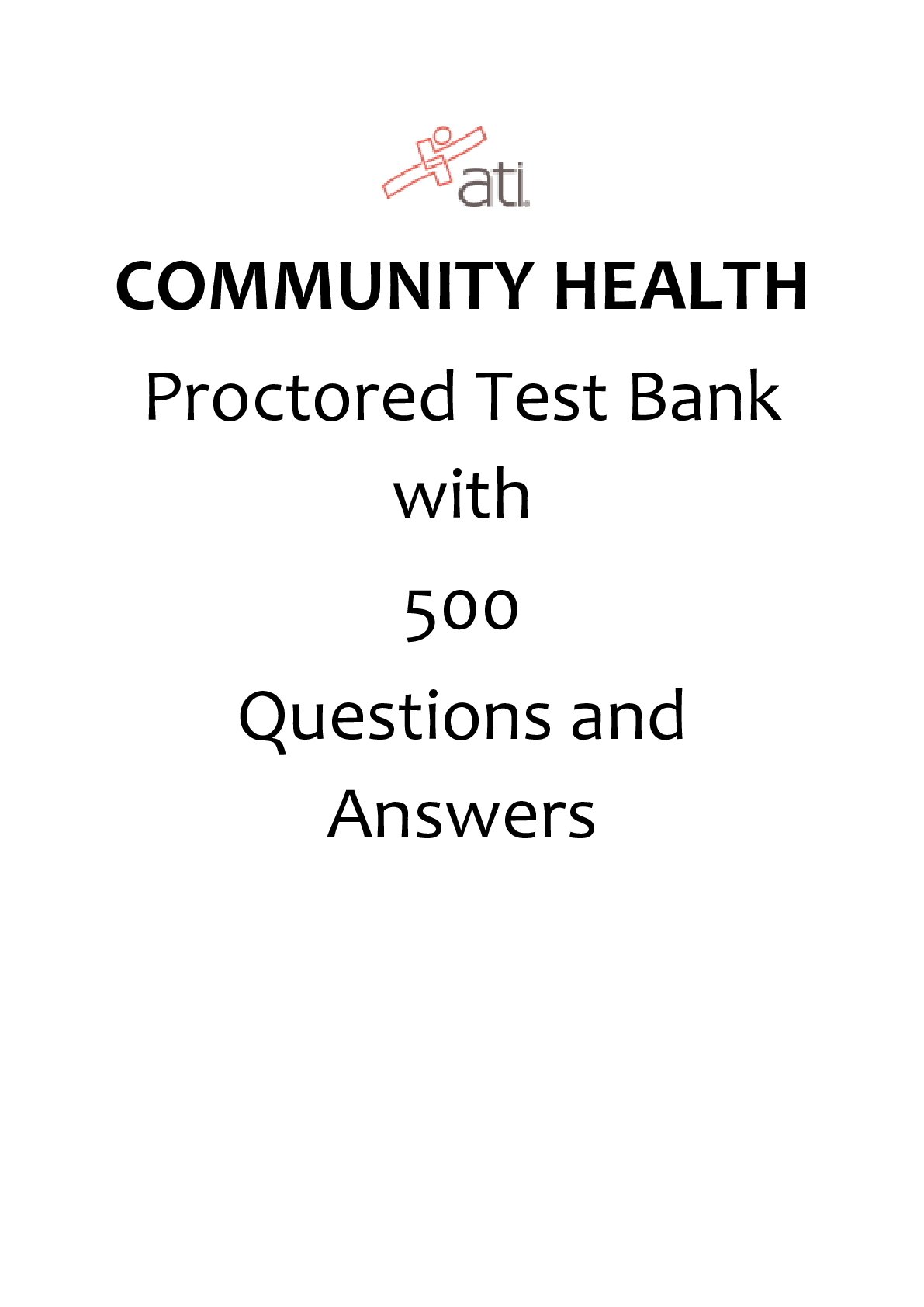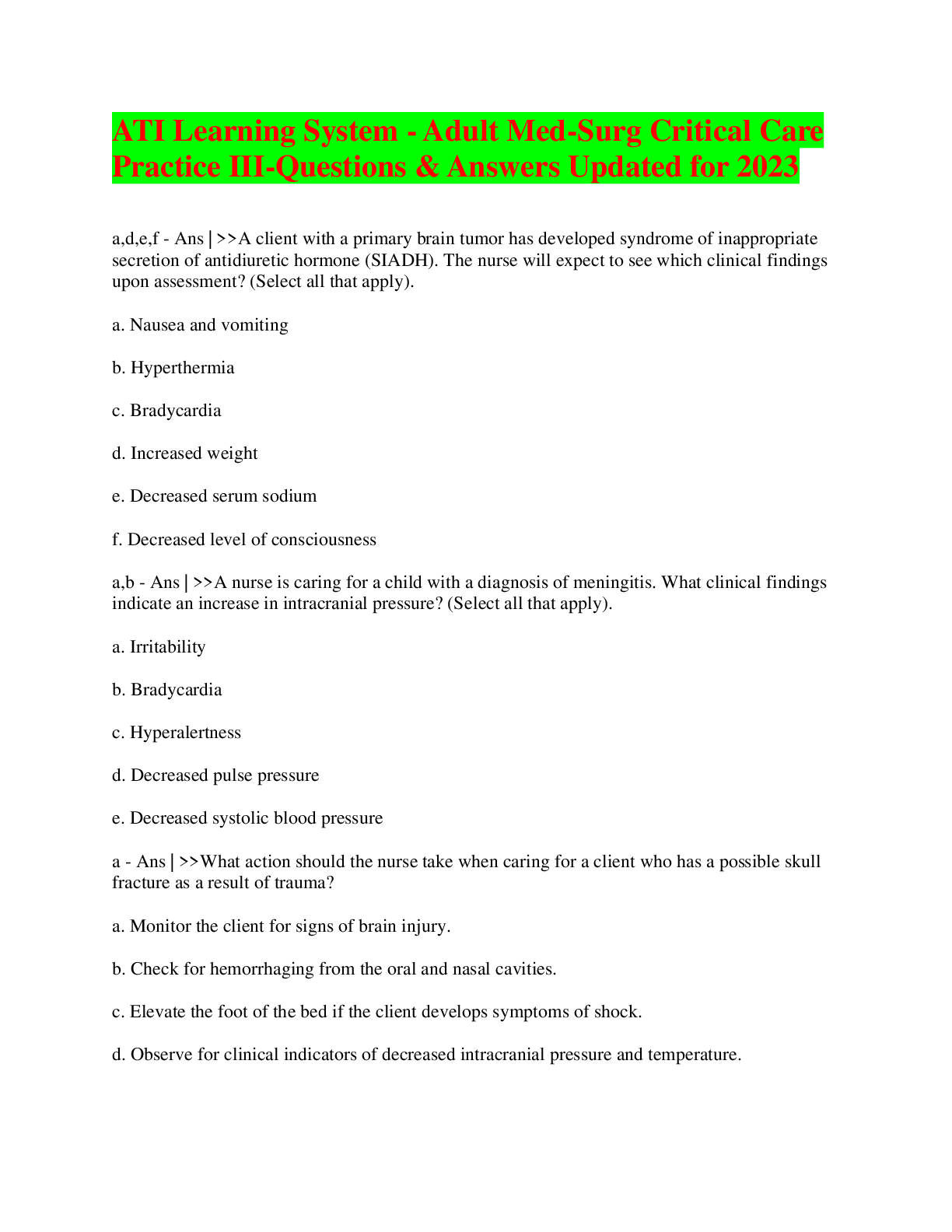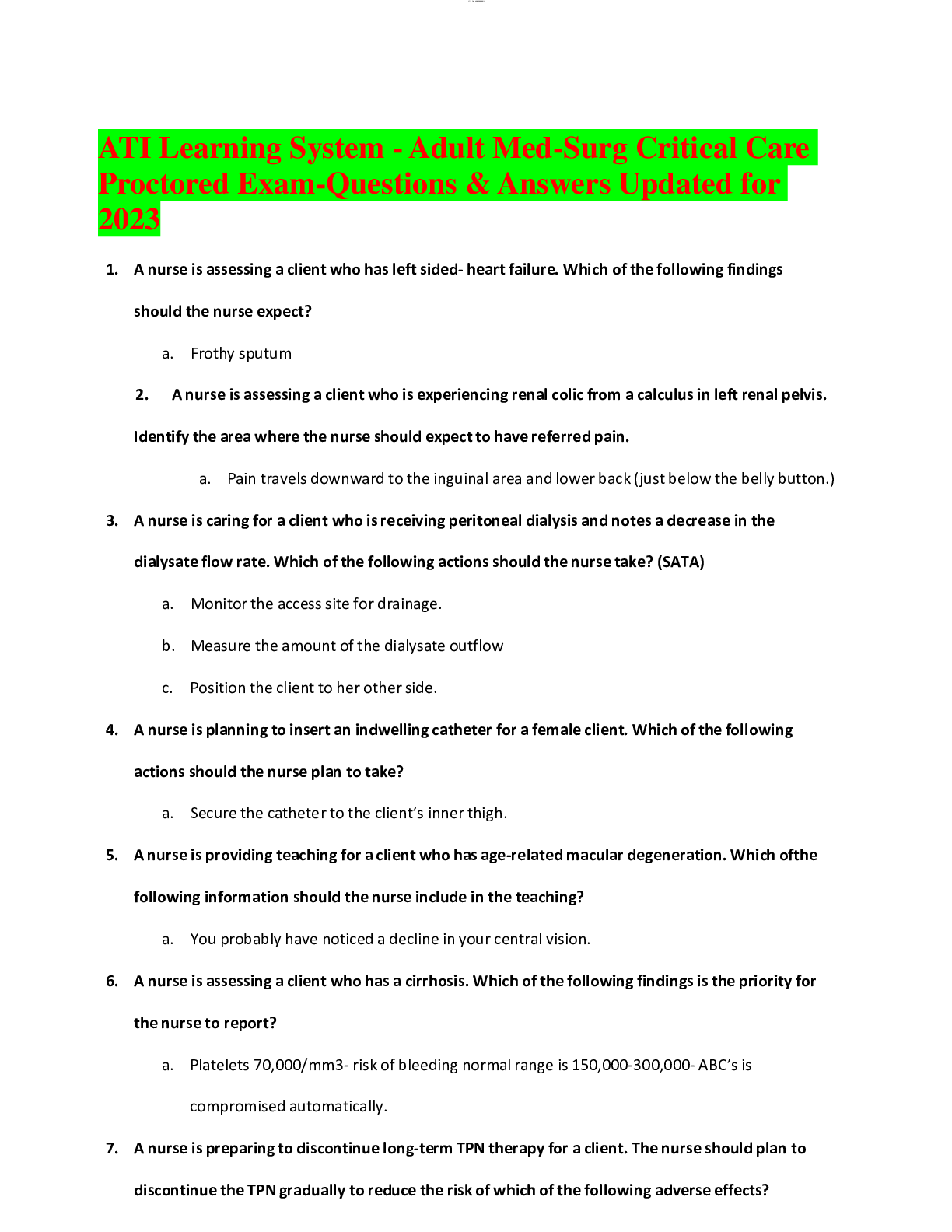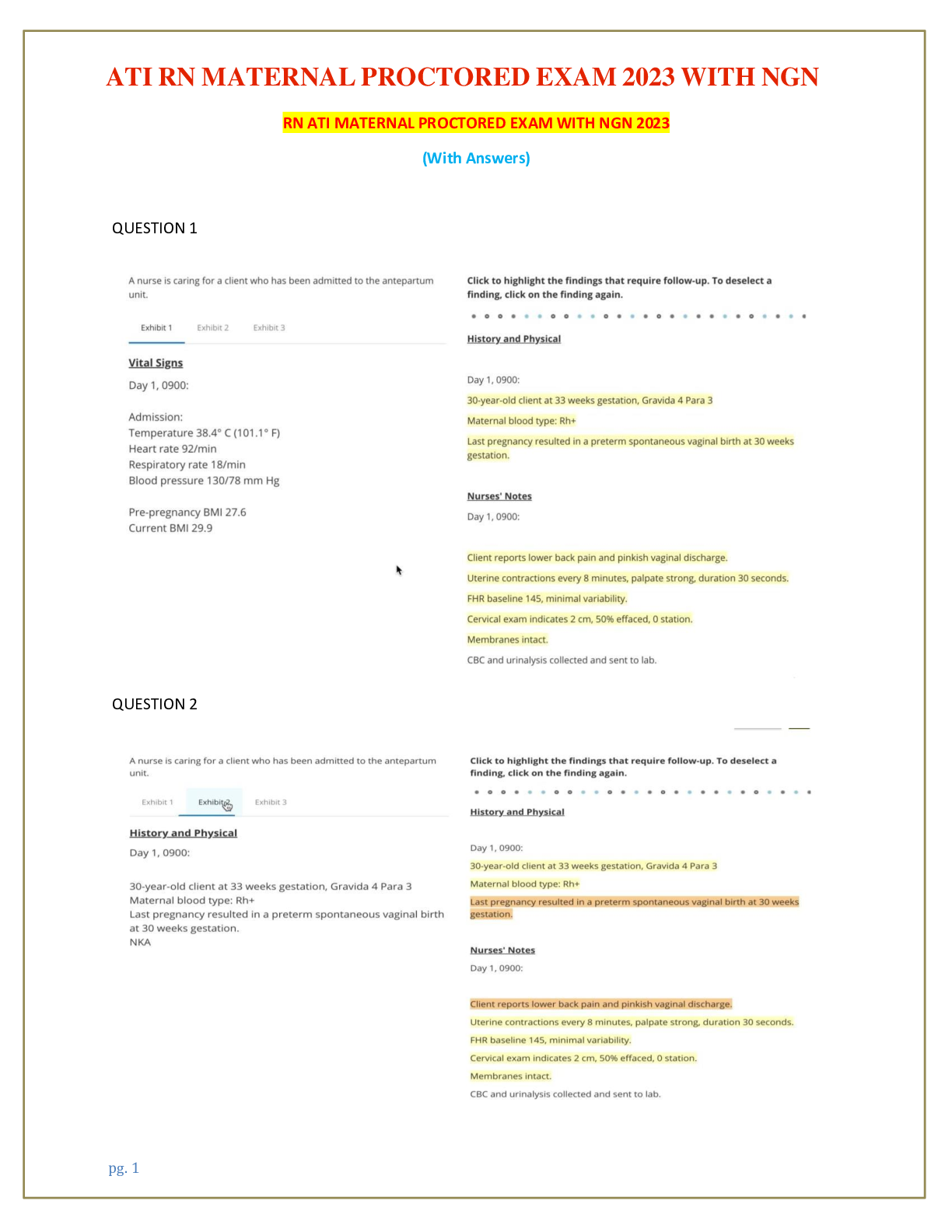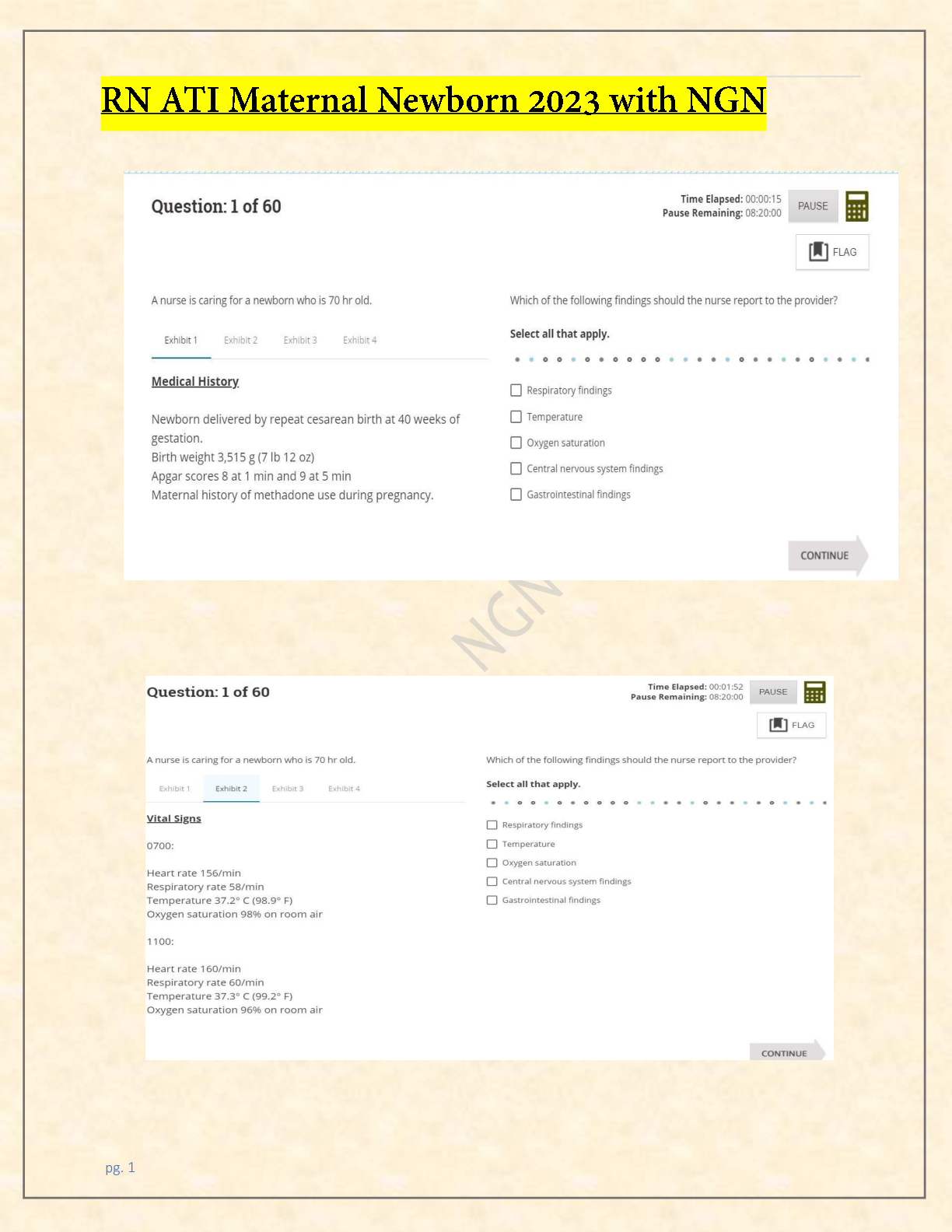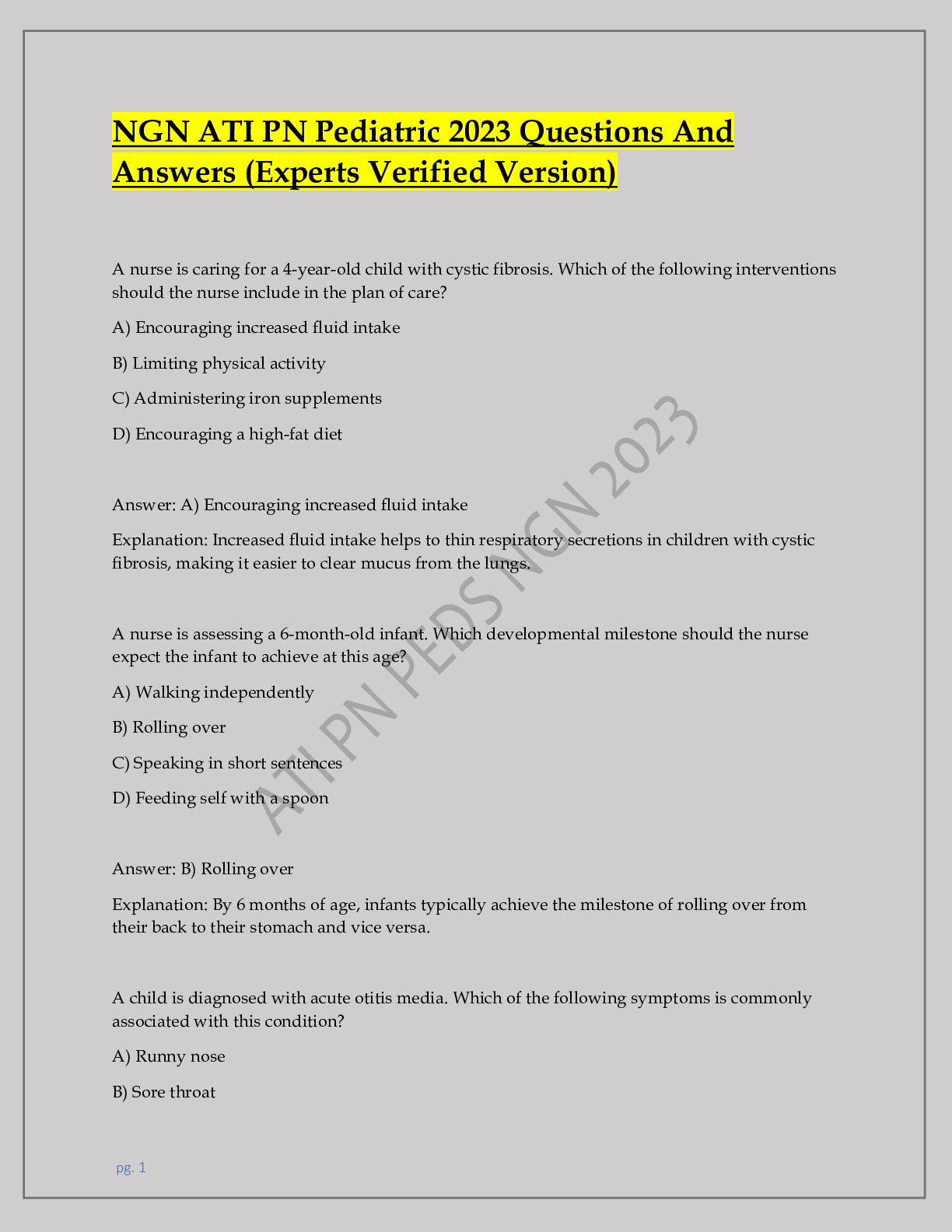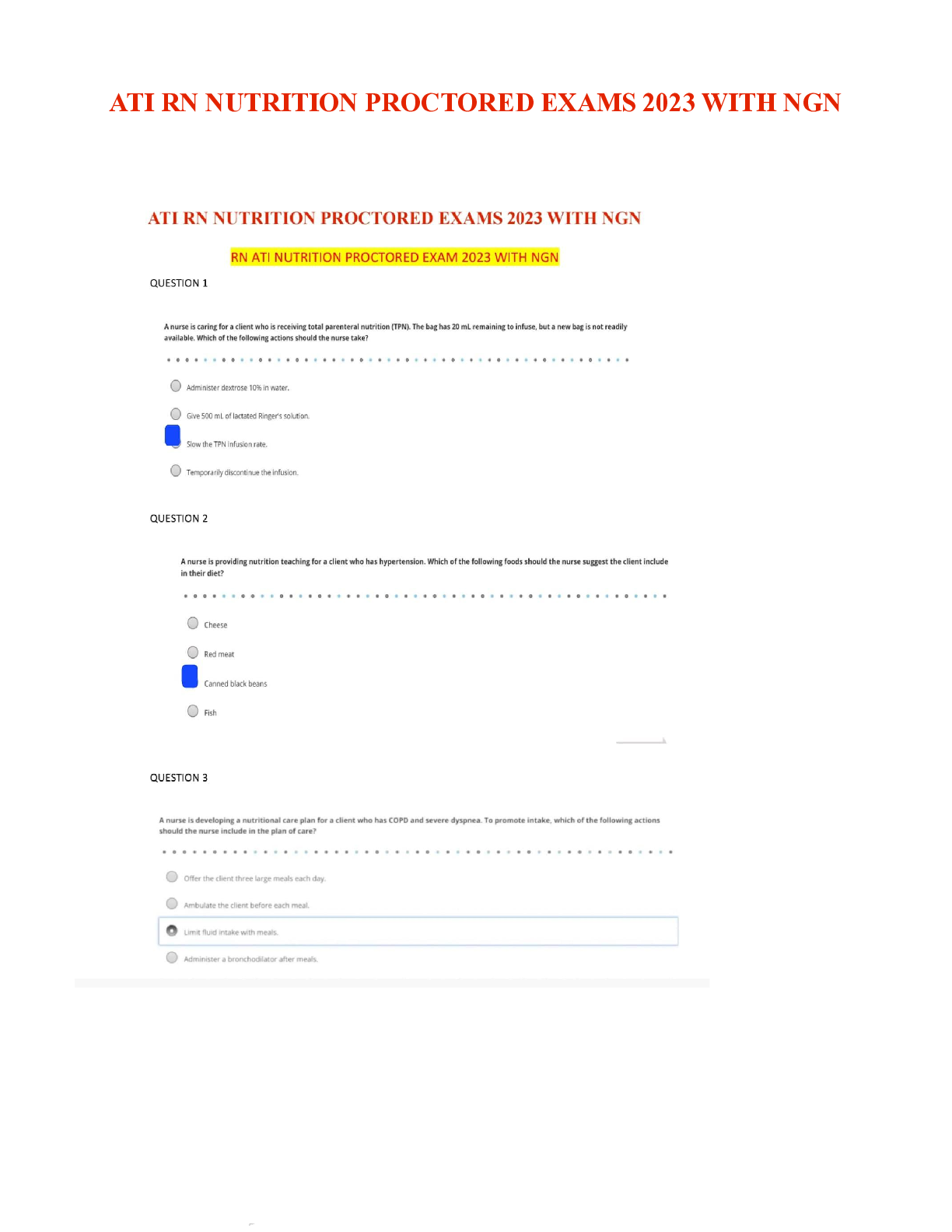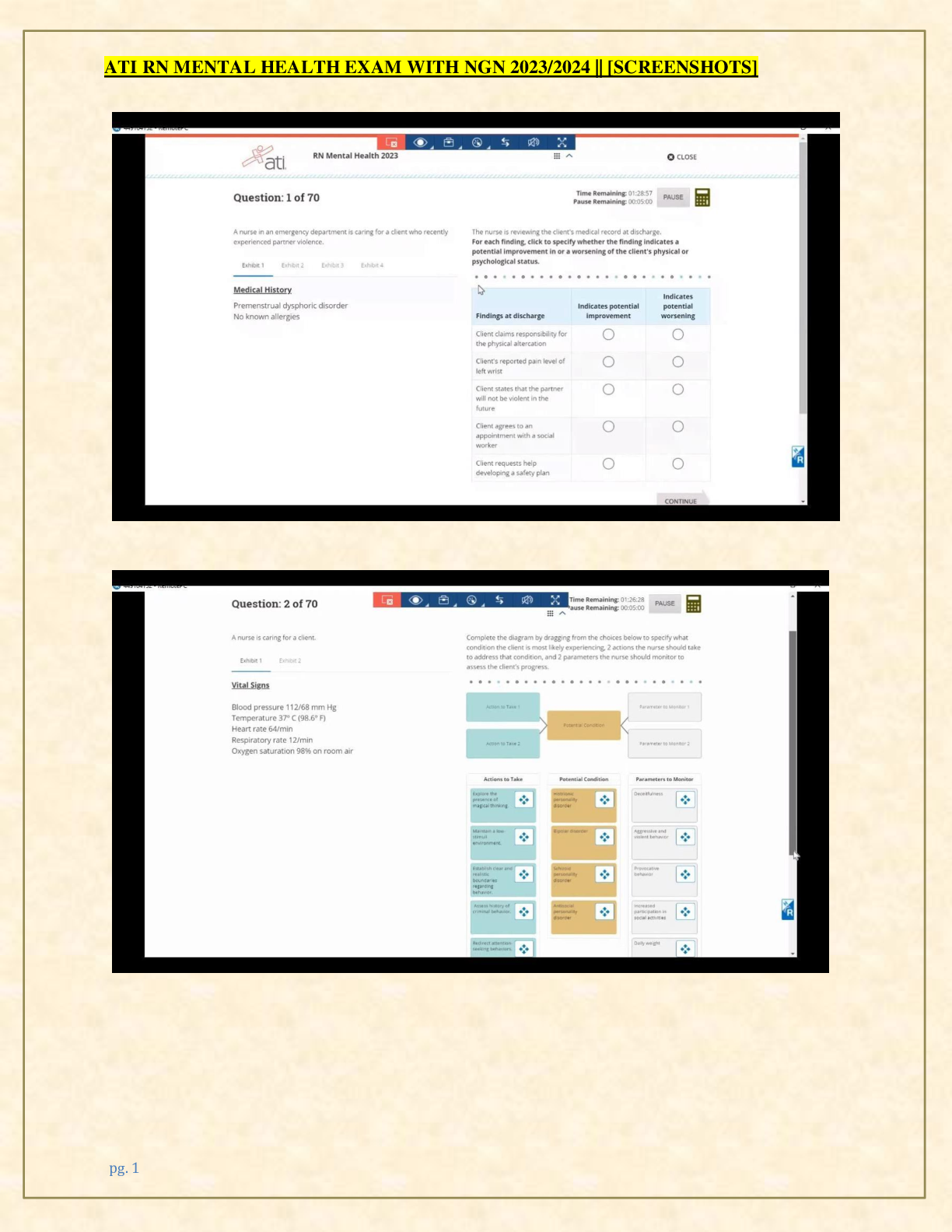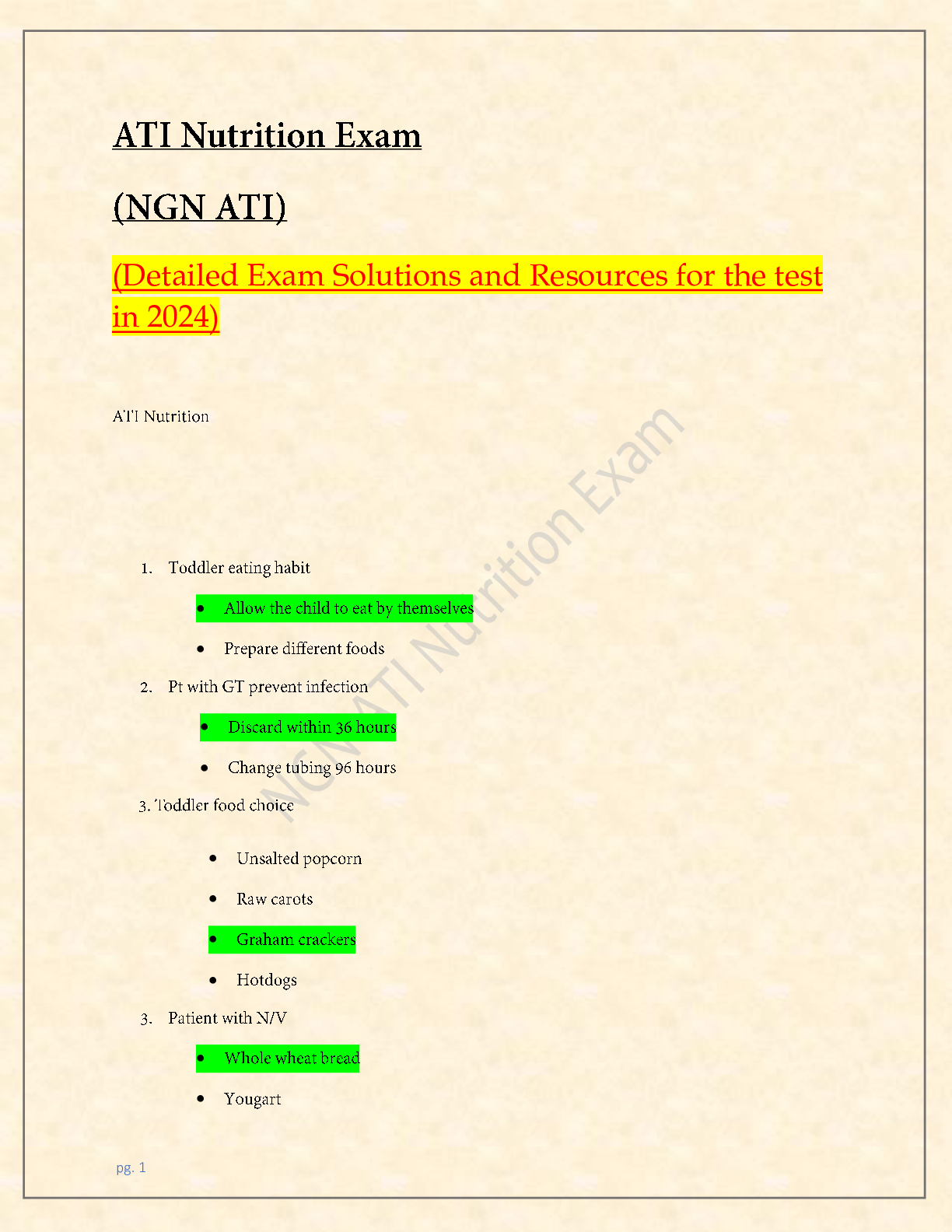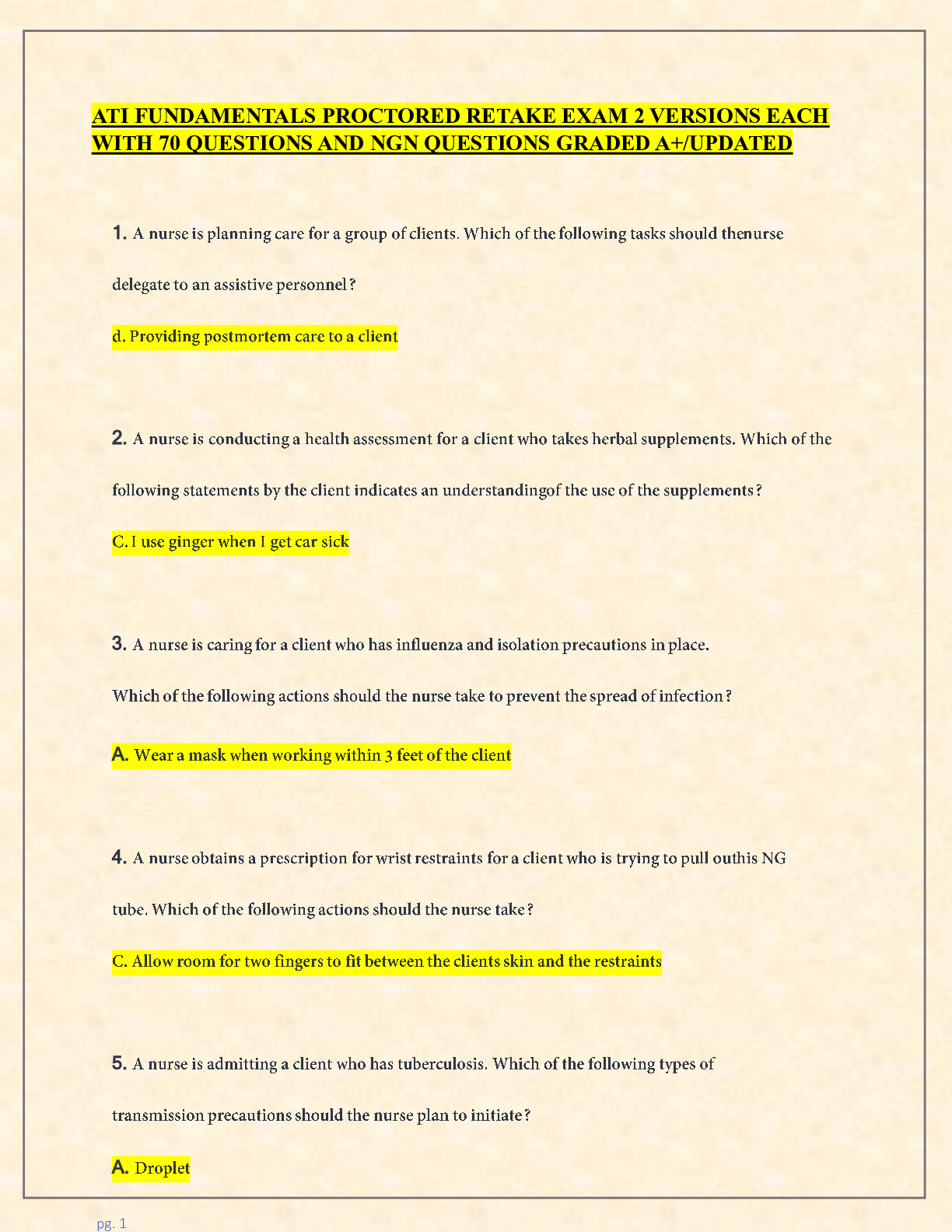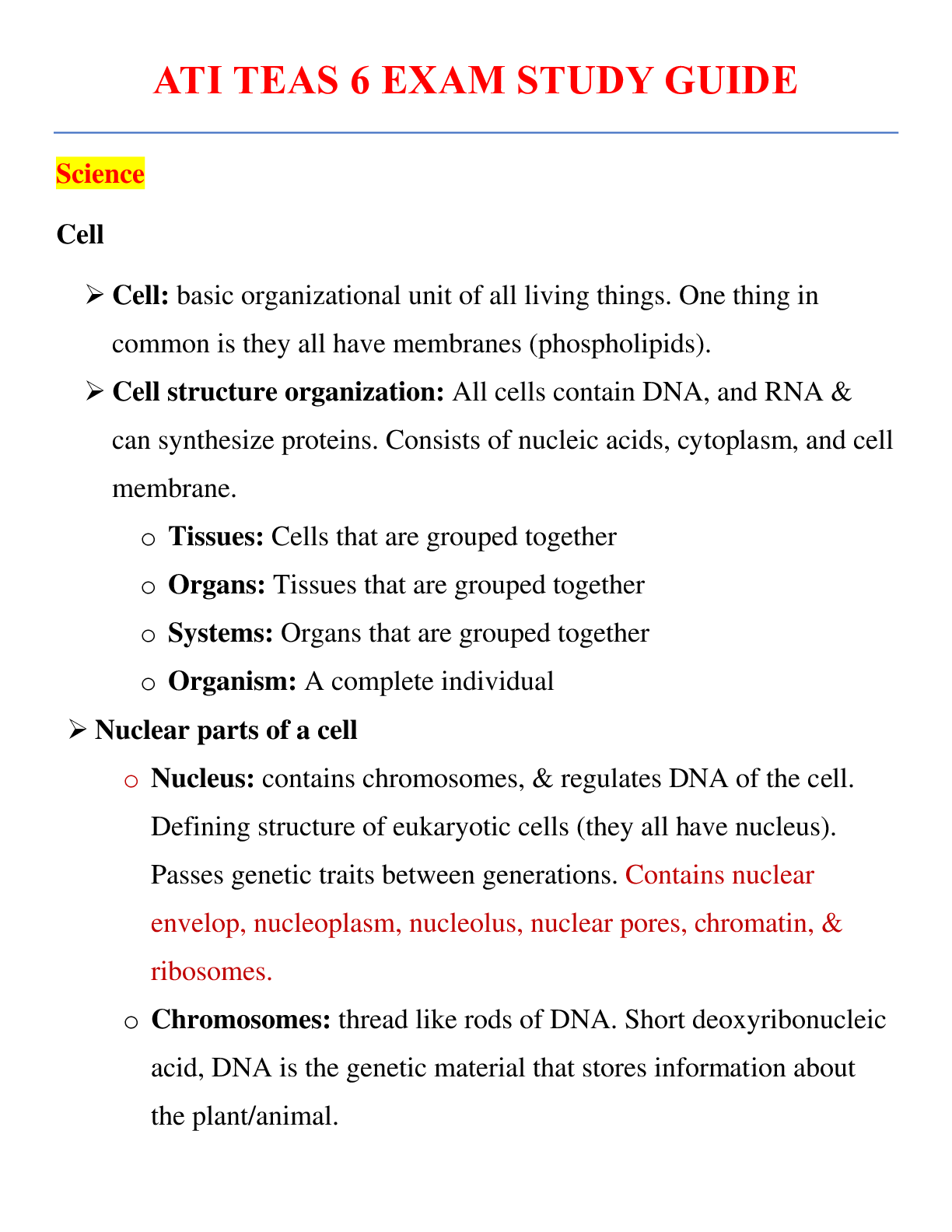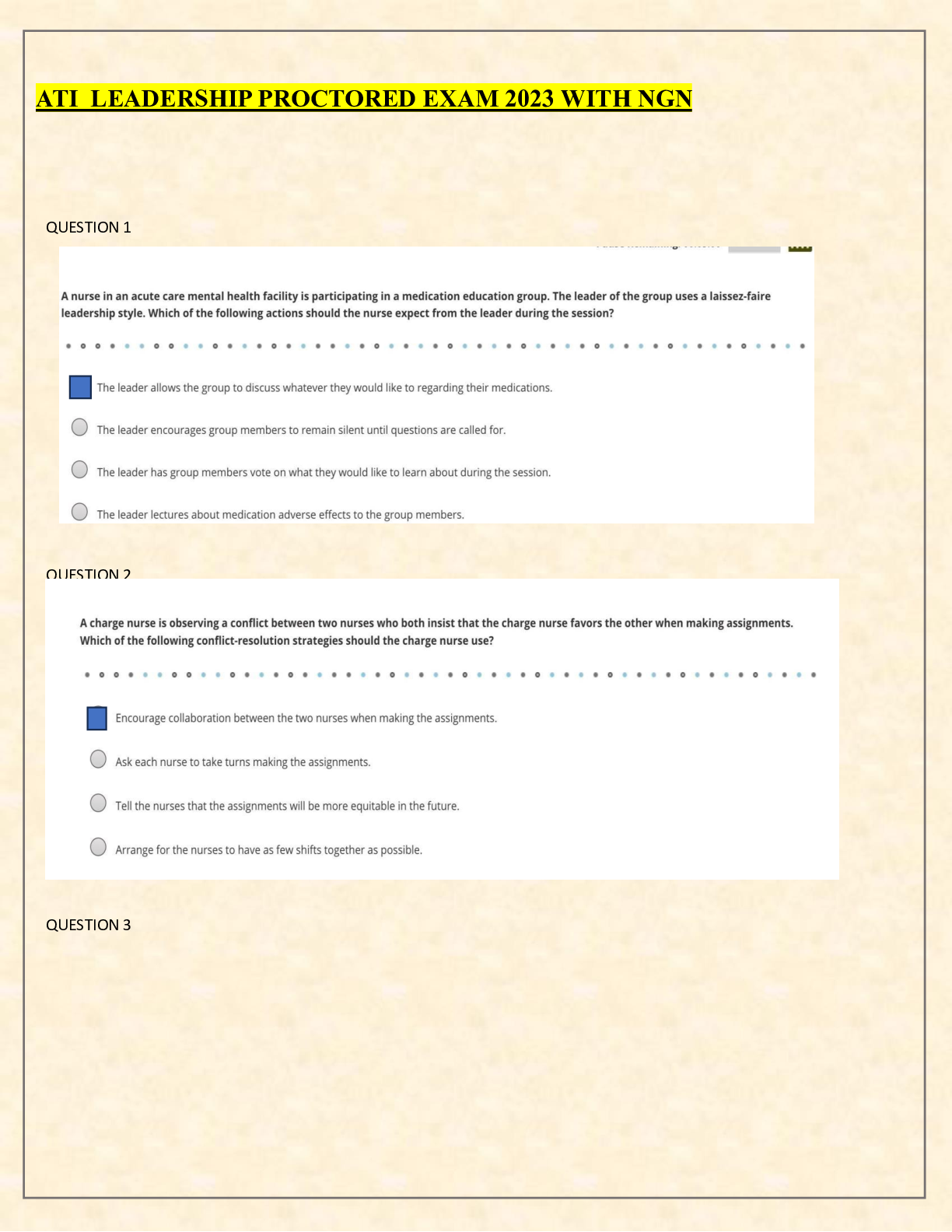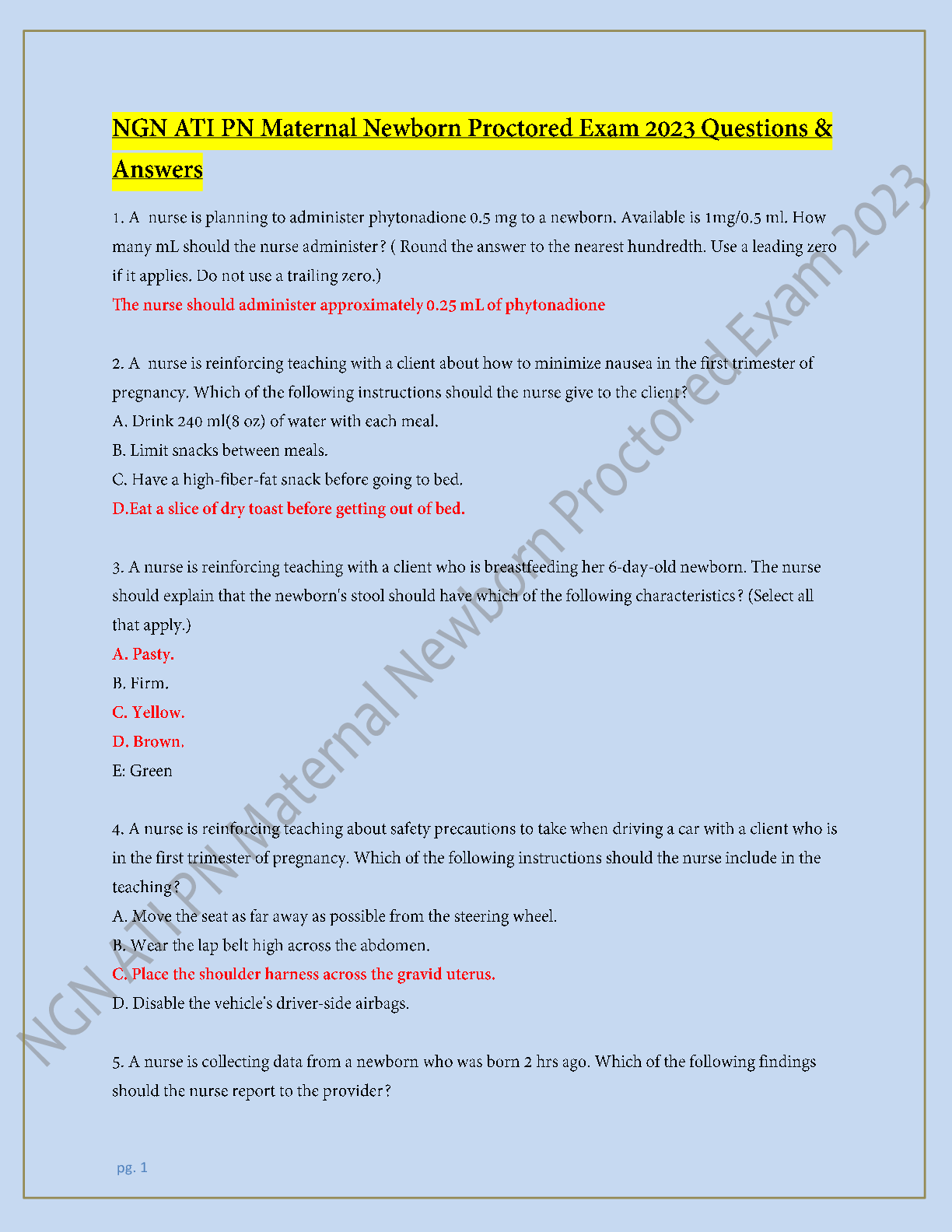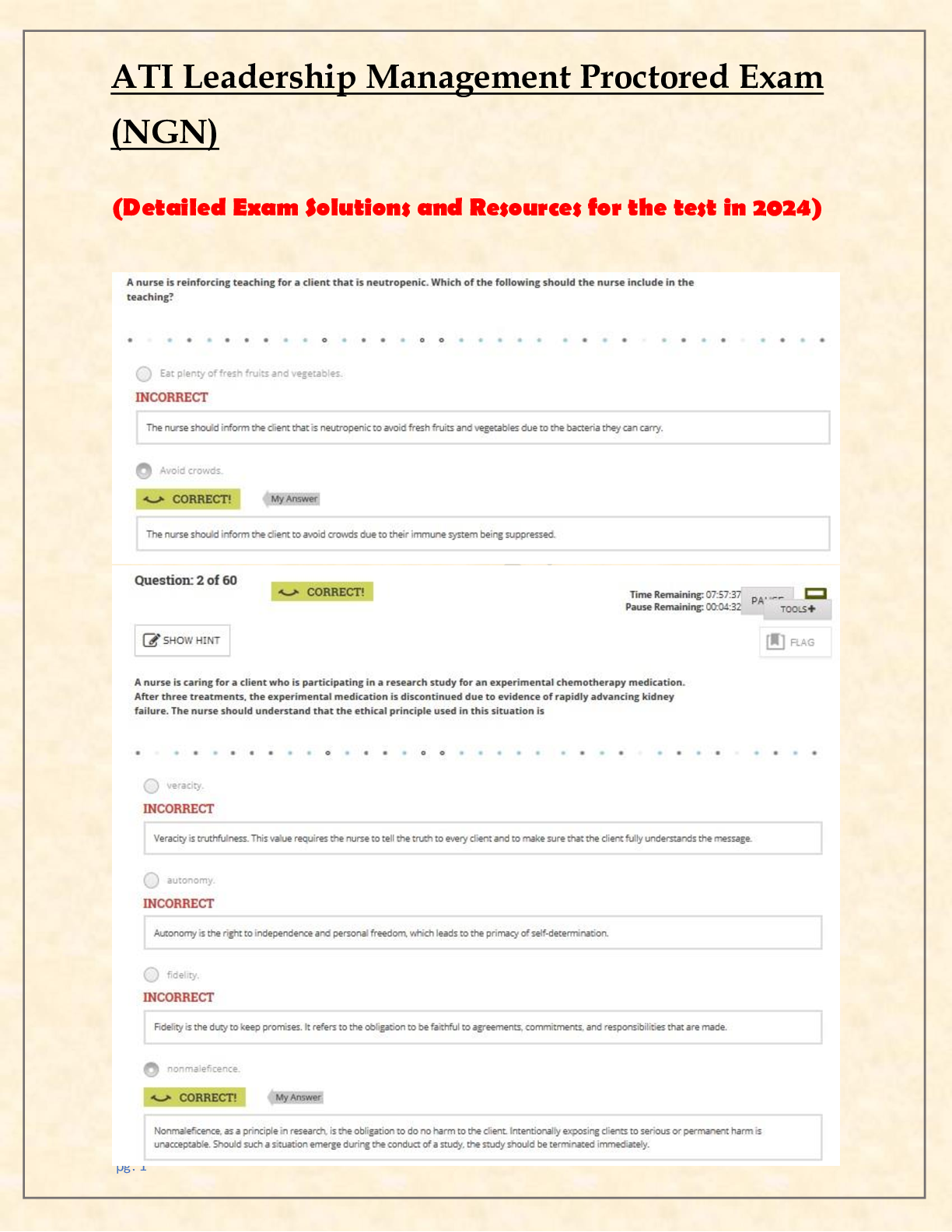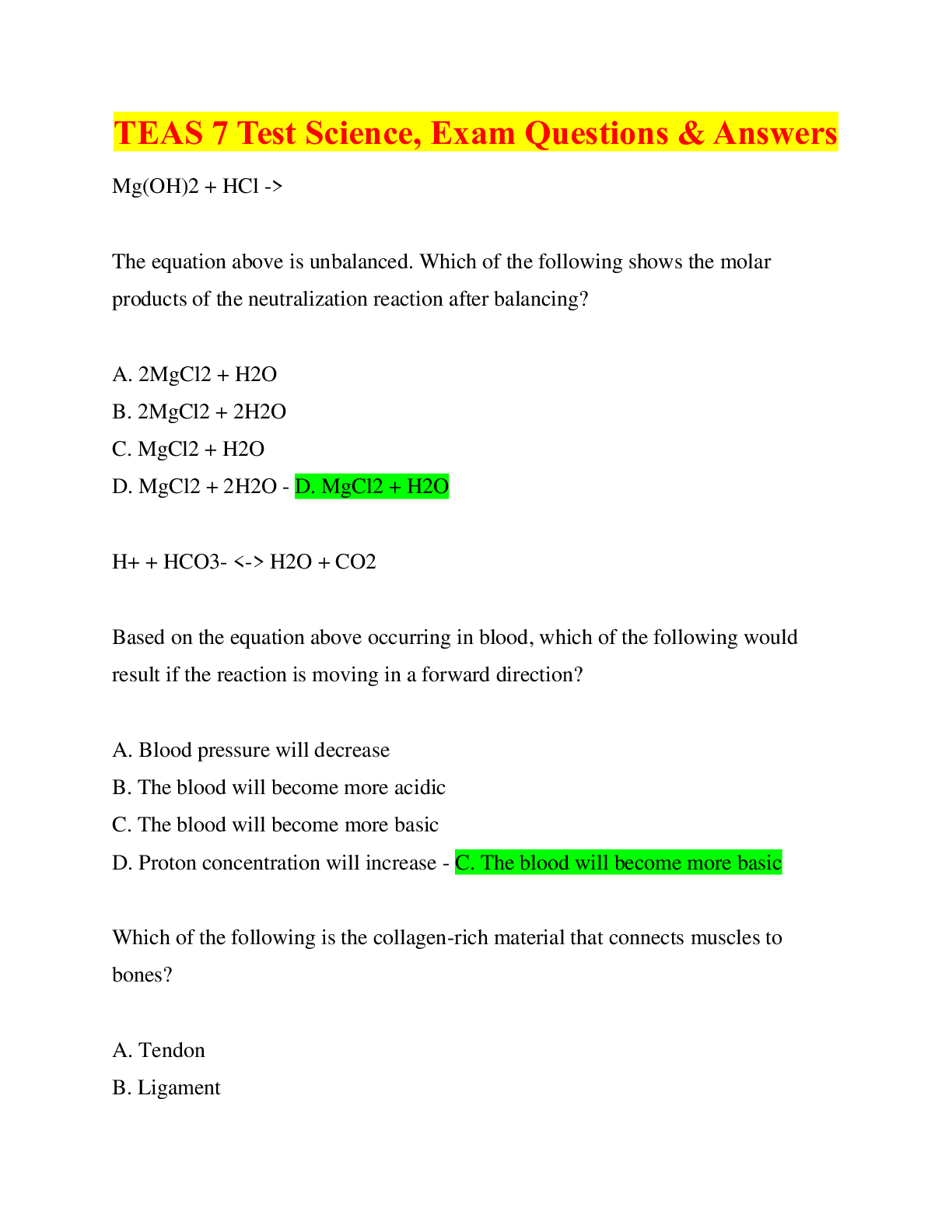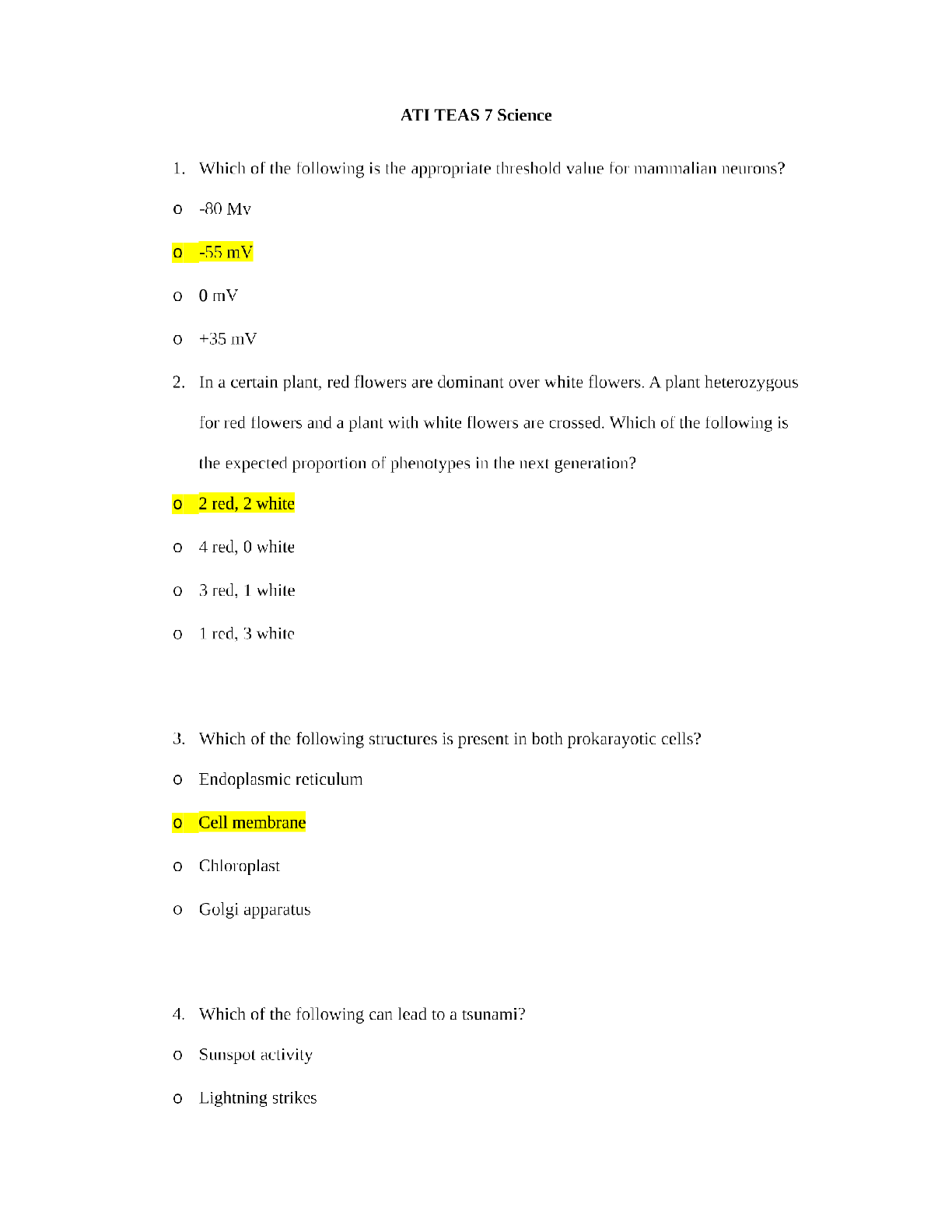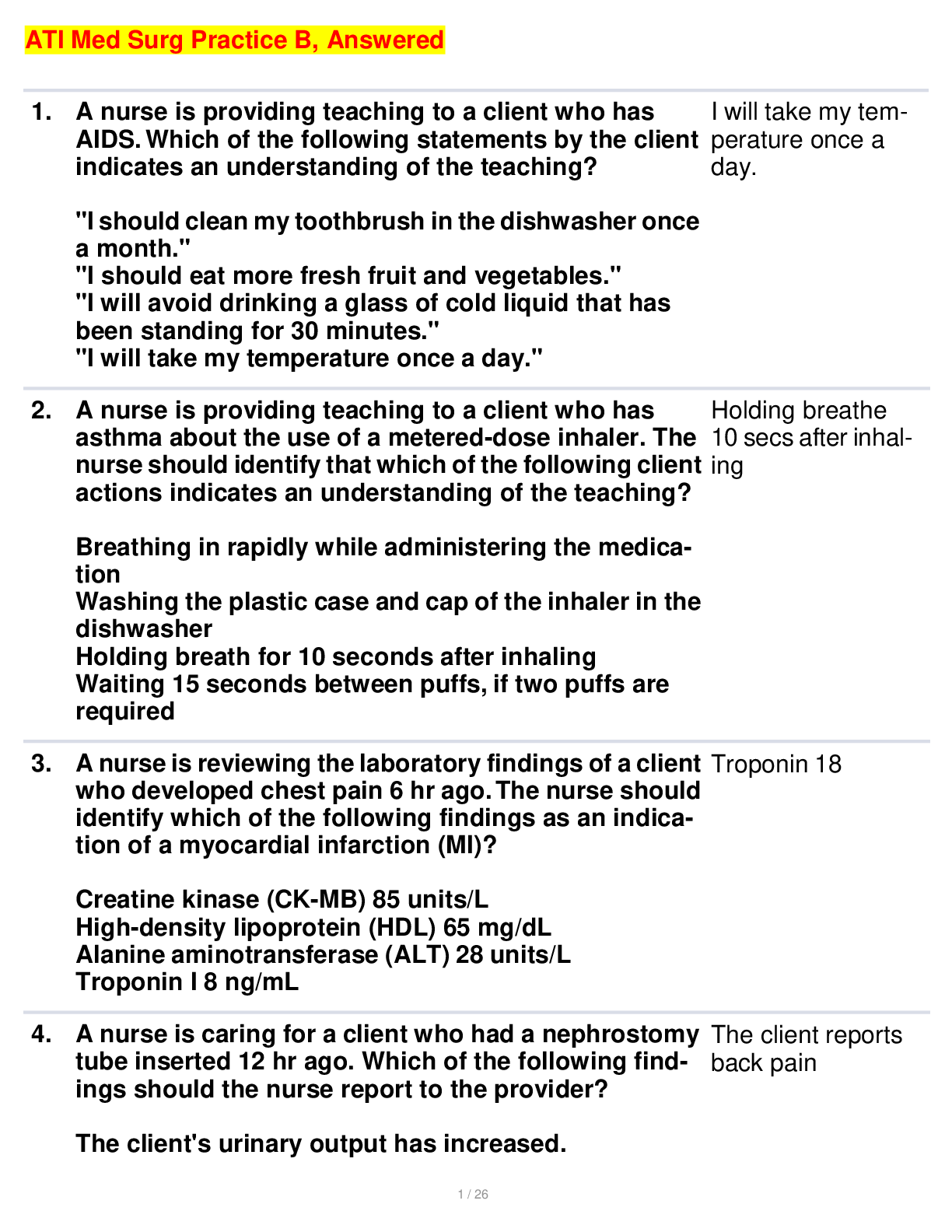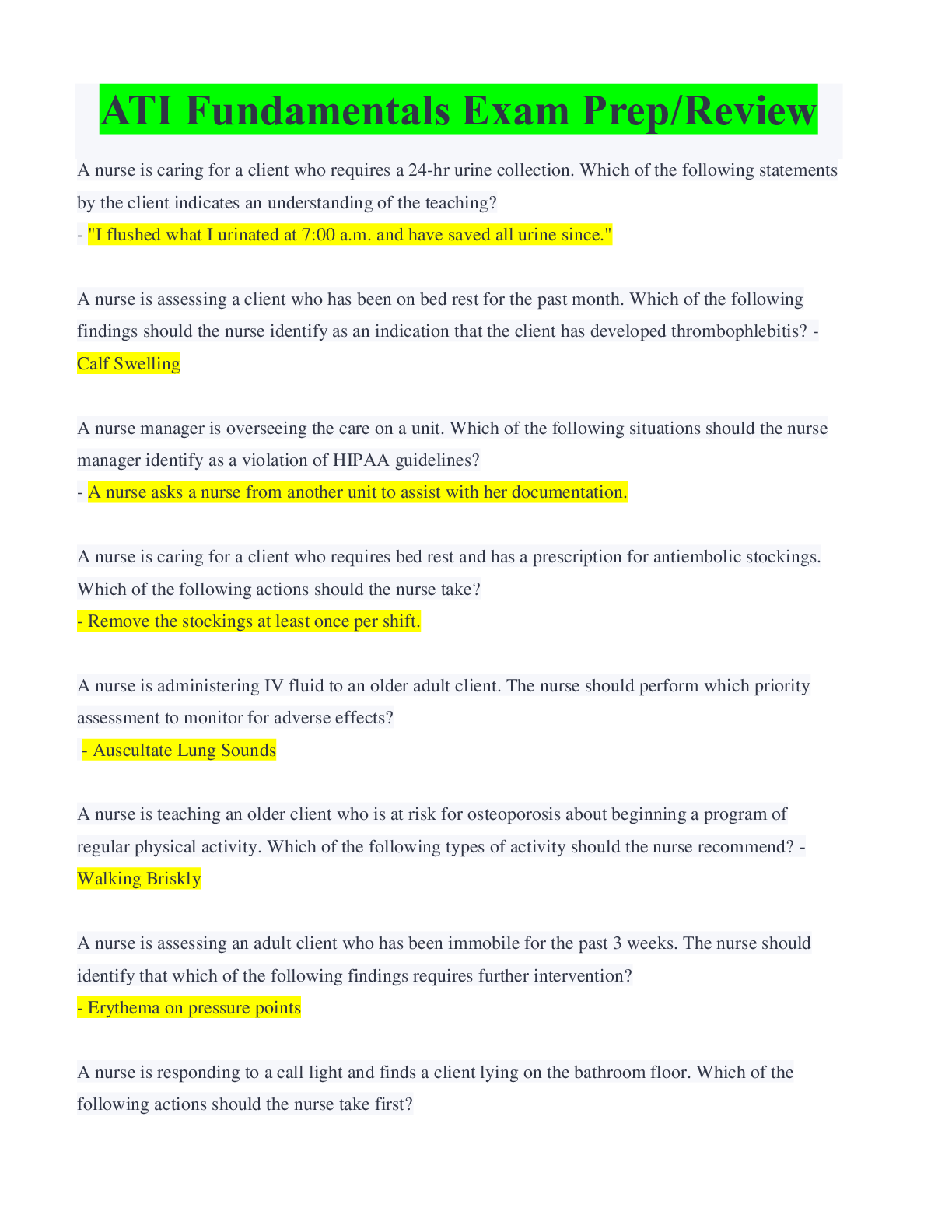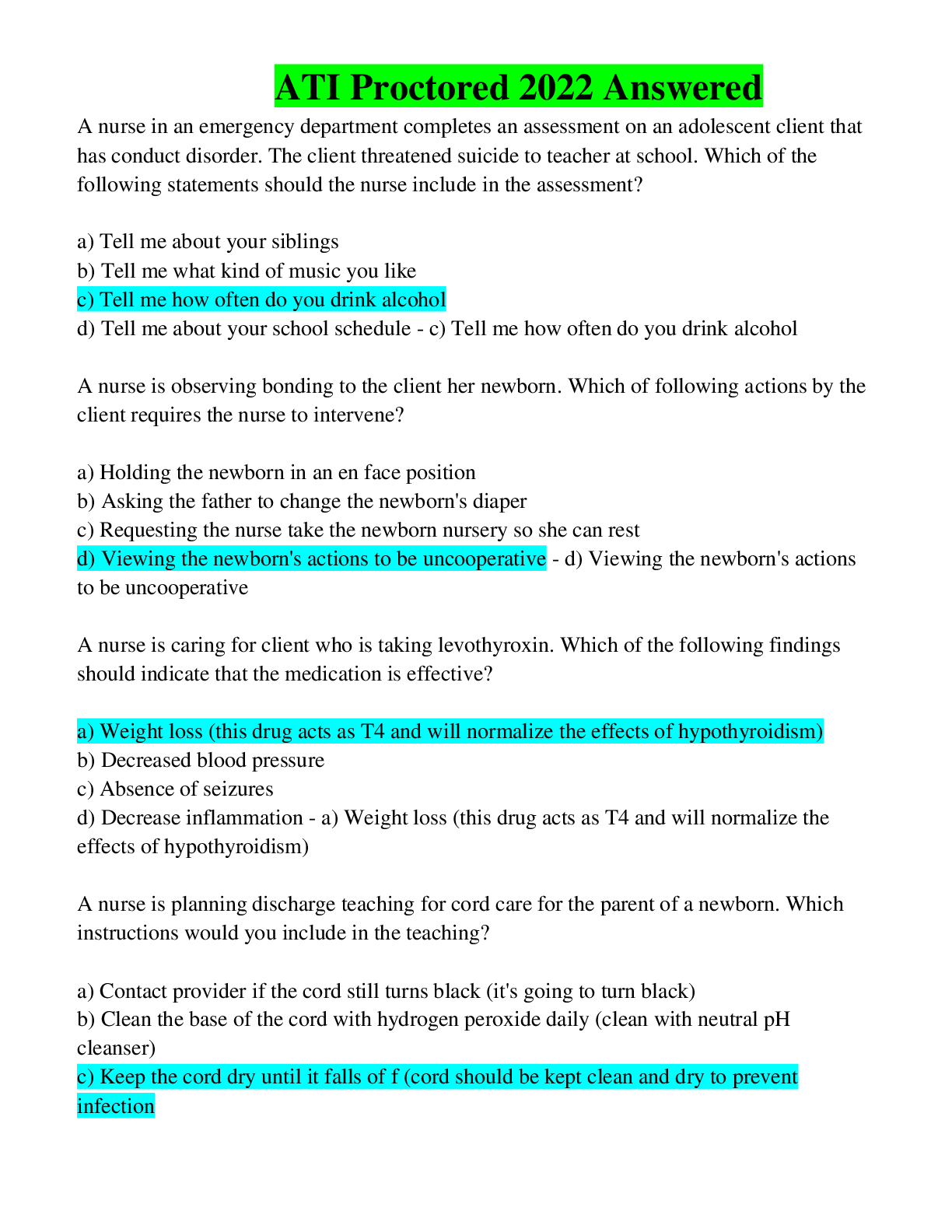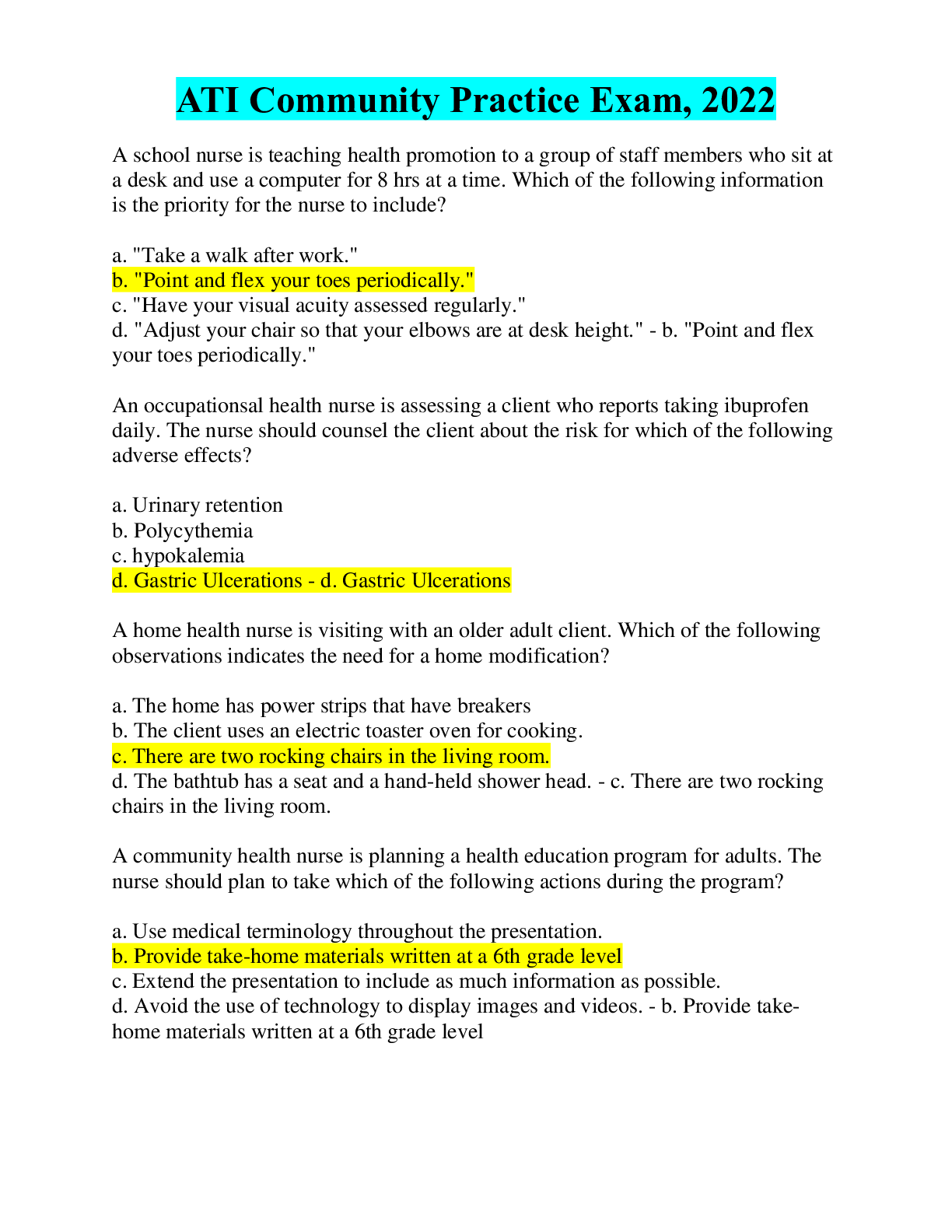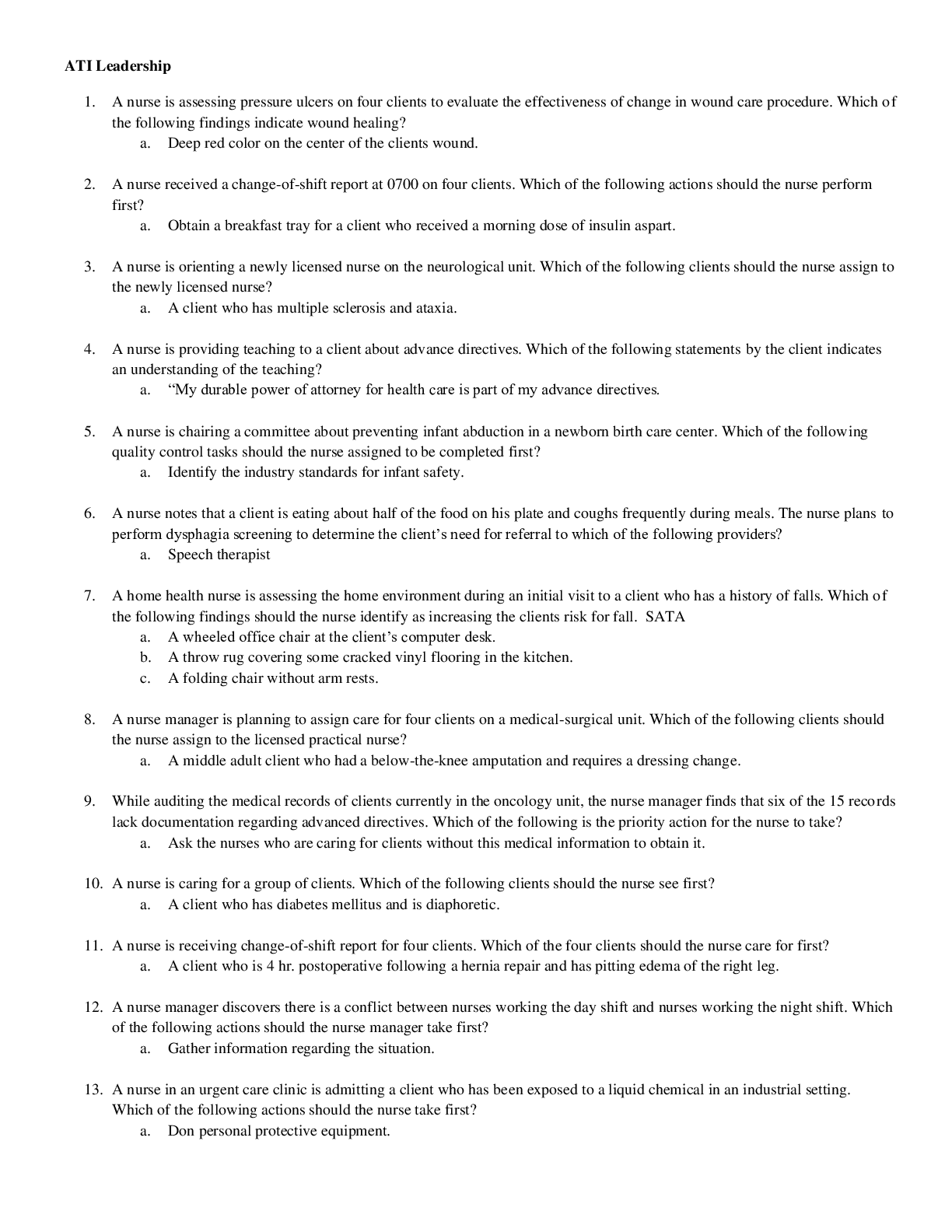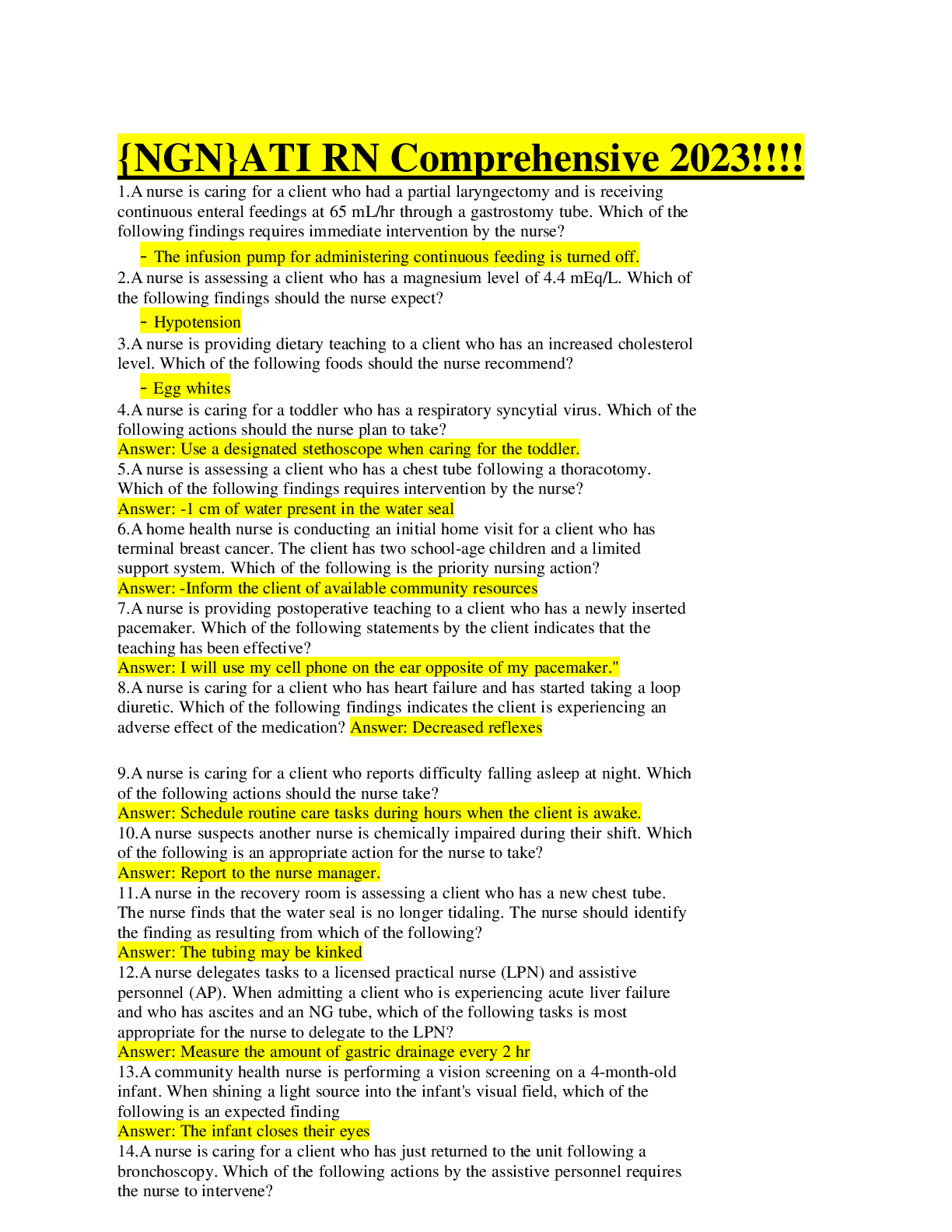ATI Pharmacology 2022 Question Bank - proofed with 300 downloads
Document Content and Description Below
"The emergency department nurse is caring for a client who has been identified as a victim of physical abuse. In planning care for the client, which is the priority nursing action? 1. Adhering to t... he mandatory abuse-reporting laws 2. Notifying the caseworker of the family situation 3. Removing the client from any immediate danger 4. Obtaining treatment for the abusing family member" "The nurse assesses a client with the admitting diagnosis of bipolar affective disorder, mania. Which client symptoms require the nurse’s immediate action? 1. Incessant talking and sexual innuendoes 2. Grandiose delusions and poor concentration 3. Outlandish behaviors and inappropriate dress 4. Nonstop physical activity and poor nutritional intake" "The nurse is caring for a client who was involuntarily hospitalized to a mental health unit and is scheduled for electroconvulsive therapy. The nurse notes that an informed consent has not been obtained for the procedure. Based on this information, what is the nurse’s best determination in planning care? 1. The informed consent does not need to be obtained. 2. The informed consent should be obtained from the family. 3. The informed consent needs to be obtained from the client. 4. The health care provider will provide the informed consent." "Trimethoprim-sulfamethoxazole (TMP-SMZ) is prescribed for a client. A nurse should instruct the client to report which symptom if it developed during the course of this medication therapy? 1.Nausea 2.Diarrhea 3.Headache 4. Sore throat" "4.Sore throat Rationale: Clients taking trimethoprim-sulfamethoxazole (TMP-SMZ) should be informed about early signs of blood disorders that can occur from this medication. These include sore throat, fever, and pallor, and the client should be instructed to notify the health care provider if these symptoms occur. The other options do not require health care provider notification." " A client is diagnosed with an acute myocardial infarction and is receiving tissue plasminogen activator, alteplase (Activase, tPA). Which action is a priority nursing intervention? 1. Monitor for renal failure. 2.Monitor psychosocial status. 3.Monitor for signs of bleeding. 4.Have heparin sodium available" "3.Monitor for signs of bleeding. Rationale: Tissue plasminogen activator is a thrombolytic. Hemorrhage is a complication of any type of thrombolytic medication. The client is monitored for bleeding. Monitoring for renal failure and monitoring the client's psychosocial status are important but are not the most critical interventions. Heparin is given after thrombolytic therapy, but the question is not asking about follow-up medications." " A client is on nicotinic acid (niacin) for hyperlipidemia and the nurse provides instructions to the client about the medication. Which statement by the client would indicate an understanding of the instructions? 1.""It is not necessary to avoid the use of alcohol."" 2.""The medication should be taken with meals to decrease flushing."" 3.""Clay-colored stools are a common side effect and should not be of concern."" 4.""Ibuprofen (Motrin) taken 30 minutes before the nicotinic acid should decrease the flushing" "4. ""Ibuprofen (Motrin) taken 30 minutes before the nicotinic acid should decrease the flushing."" Rationale: Flushing is a side effect of this medication. Aspirin or a nonsteroidal anti- inflammatory drug can be taken 30 minutes before taking the medication to decrease flushing. Alcohol consumption needs to be avoided because it will enhance this side effect. The medication should be taken with meals, this will decrease gastrointestinal upset. Taking the medication with meals has no effect on the flushing. Clay-colored stools are a sign of hepatic dysfunction and should be immediately reported to the health care provider (HCP)." " A client who has been newly diagnosed with diabetes mellitus has been stabilized with daily insulin injections. Which information should the nurse teach when carrying out plans for discharge? 1. Keep insulin vials refrigerated at all times. 2.Rotate the insulin injection sites systematically. 3.Increase the amount of insulin before unusual exercise. 4.Monitor the urine acetone level to determine the insulin dosage" "2.Rotate the insulin injection sites systematically. Rationale: Insulin dosages should not be adjusted or increased before unusual exercise. If acetone is found in the urine, it may possibly indicate the need for additional insulin. To minimize the discomfort associated with insulin injections, the insulin should be administered at room temperature. Injection sites should be systematically rotated from one area to another. The client should be instructed to give injections in one area, about 1 inch apart, until the whole area has been used and then to change to another site. This prevents dramatic changes in daily insulin absorption." " A client who is receiving digoxin (Lanoxin) daily has a serum potassium level of 3.0 mEq/L and is complaining of anorexia. A health care provider prescribes a digoxin level to rule out digoxin toxicity. A nurse checks the results, knowing that which of the following is the therapeutic serum level (range) for digoxin? 1.3 to 5 ng/mL 2.0.5 to 2 ng/mL 3. 1.2 to 2.8 ng/mL 4.3.5 to 5.5 ng/mL" "2.) 0.5 to 2 ng/mL Rationale: Therapeutic levels for digoxin range from 0.5 to 2 ng/mL. Therefore, options 1, 3, and 4 are incorrect" " A client with coronary artery disease complains of substernal chest pain. After checking the client's heart rate and blood pressure, a nurse administers nitroglycerin, 0.4 mg, sublingually. After 5 minutes, the client states, ""My chest still hurts."" Select the appropriate actions that the nurse should take. Select all that apply. 1.Call a code blue. 2.Contact the registered nurse. 3.Contact the client's family. 4. Assess the client's pain level. 5.Check the client's blood pressure. 6.Administer a second nitroglycerin,0.4 mg, sublingually." "2.Contact the registered nurse. 4.Assess the client's pain level. 5.Check the client's blood pressure 6.Administer a second nitroglycerin,0.4 mg, sublingually Rationale:The usual guideline for administering nitroglycerin tablets for a hospitalized client with chest pain is to administer one tablet every 5 minutes PRN for chest pain, for a total dose of three tablets. The registered nurse should be notified of the client's condition, who will then notify the health care provider as appropriate. Because the client is still complaining of chest pain,the nurse would administer a second nitroglycerin tablet. The nurse would assess the client's pain level and check the client's blood pressure before administering each nitroglycerin dose. There are no data in the question that indicate the need to call a code blue. In addition, it is not necessary to contact the client's family unless the client has requested this" [Show More]
Last updated: 1 year ago
Preview 1 out of 80 pages
.png)
Reviews( 0 )
Document information
Connected school, study & course
About the document
Uploaded On
Nov 22, 2021
Number of pages
80
Written in
Additional information
This document has been written for:
Uploaded
Nov 22, 2021
Downloads
0
Views
144

